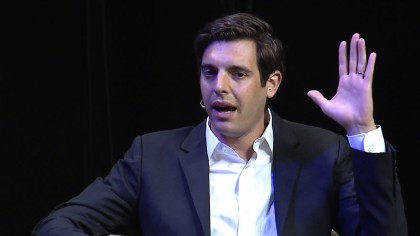FanDuel CEO on regulation, fantasy sports innovation, and the NBA's rise
What's next for daily fantasy?

Sign up for breaking news, reviews, opinion, top tech deals, and more.
You are now subscribed
Your newsletter sign-up was successful
The last year has been a tumultuous one for Nigel Eccles, CEO of FanDuel, but you'd never know it. During his fireside chat at Collision Conference with Forbes' Steven Bertoni, he shook off the notion that regulation and a mainstream shift in perception was a "distraction." At worst, he said, it delayed a number of innovations on the product side, but those are evidently coming real soon.
The topic of conversation was "Fantasy's Future," and more specifically, the future of daily fantasy. What began as a niche industry began to rake in billions in 2014, and by 2015, had caught the attention of regulators the world over. "It was a very, very scary period," said Eccles. "Sentiment shifted very quickly against daily fantasy sports. You can imagine as a company with all of this momentum -- our focus was growth. And then, everyday you'd wake up and think, 'Oh my God, there goes Illinois, there goes Texas.'"
Speaking specifically about regulation, he noted that prior gambling laws "weren't written with us in mind." He continued: "The laws didn't envisage multi-billion dollar businesses operating at our scale. We always knew we'd have to become a regulated industry; we just didn't know how that would happen."
To his credit, he also noted that "the speed at which government has taken on an issue is impressive," and through the process, he discovered that many legislators "are very forward-thinking and pro-business." It seems that both sides really just wanted "consumer protection for players," and that's largely what we've ended up with after a year of hoopla.
Big business in fantasy

The like of FanDuel and DraftKings have weathered the storm, and now, Eccles hopes that the soon-to-be-improved FanDuel app will become a "Top 5 app" for its users. Presently, some 50 million people play fantasy sports, with FanDuel alone claiming 6 million registered users.
Eccles has an enviable user base, too. According to him, an average FanDuel consumer "consumes sport 24 hours per week, with a lot of it on the fantasy side." Many of those users are borderline addicted to the product, and FanDuel is able to give advertisers incredibly granular data on what matches are being played, what sports and players a user likes, etc. There's a lot of data being generated and analyzed, even in fantasy sports, and that's the stuff of dreams for marketers.
In fact, it's the stuff of dreams for hardcore players. Eccles cited three primary reasons for FanDuel customers falling head over heels for the product: "They love the research, competition, and the live scoring. Money comes fourth or fifth. It's not the main driver. Over the last year, we probably overemphasized the money angle. There's a pure joy [in being engaged] - that's what we're going to bring forward this year."
Sign up for breaking news, reviews, opinion, top tech deals, and more.
NBA gets a boost
Historically, fantasy basketball wasn't a major thing. The season is long, lineups change nightly, and it's pretty tough to follow when you're also holding down a full-time job. Daily fantasy, however, changed all that.
When asked by Bertoni which sport had seen the biggest boost from the rise of daily fantasy, Eccles answered with nary a hint of hesitation: "Over the last three years, NBA growth has been phenomenal. Fantasy basketball hasn't been great because it's a long season. Daily changed that because you could play on a Tuesday night but not on a Wednesday night. NBA also has a technologically-engaged demographic. It's the most exciting, fast, action-packed sport for fantasy. You always think you're winning right up until the end."
FanDuel's playoff aspirations

Eccles wrapped things up by shedding a bit of light on what's next for his company. In the short term, we're told to expect a revamped app that makes it easier for novice and casual users to drop into play without a lot of setup, while also labeling pro players as such in a bid to add a new layer of player transparency.
"What you'll see is much more investment in the product," said Eccles. "Some of that connects with the regulatory/compliance side. It'll be much more user-friendly, and you'll be able to easily spot higher-skilled players. Over a longer time frame, you'll see more innovation in the live sports experience."
Though states like New York have given daily fantasy a tough time, it's clearly growing. The bigger question, however, is this: when a sizable amount of sports fans begin to watch games with an eye on statistics rather than an eye on enjoyment, how will the games we've grown up with begin to change?
